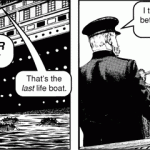The Titanic was a popular theme in the talks at our fundamentalist Christian school. The presentation was straightforward: human pride and crying out to God for help, except both of the stories we were told were untrue.
Titanic was presented as a tale of human hubris, as arrogance manifested in a claim that the ship was unsinkable; except that such a claim was not made, not by Harland and Wolff, not by White Star Line. The nearest anyone came to such an expression was a journalist’s comment that the ship was ‘practically unsinkable’; hardly a case of an endemic arrogance that was suggested in the talks. And far from the mighty being put down from their seats and the humble and meek being exalted, it was the steerage passengers, the poorest aboard, who suffered the most. The sinking of the Titanic hardly accords with the picture of God presented by Jesus of Nazareth.
It wasn’t just the belief that the sinking of the liner was a matter of pride coming before a fall; the idea of the strains of ‘Bethany’, which gained popularity as the tune for ‘Nearer, my God, to thee’, being played as the ship sank does not accord with the facts.
On 28th April 1912, Harold Bride, radio operator on the Titanic was interviewed in the New York Times, Bride became known for his eye for detail and his accurate recall of events. He describes the final music played on the sinking ship.
The way the band kept playing was a noble thing. I heard it first while we were still working wireless, when there was a ragtime tune for us, and the last I saw of the band, when I was floating out in the sea with my lifebelt on, it was still on deck playing ‘Autumn’. How they ever did it, I cannot imagine.
‘Autumn’ was a popular dance tune at the time, the sort of tune a ship’s band might have played, and there is no reason why Harold Bride would not have reported things as he remembered them, particularly when the interview was so close to the event.
Furthermore, ‘Bethany’, would not have been known to Wallace Hartley, the band leader. Hartley was an English Methodist and would have known a tune called ‘Horbury’ by John Bacchus Dykes and ‘Propior Deo’ (Nearer to God) by Sir Arthur Sullivan. Methodists preferred ‘Propior Deo’ and the opening notes of the tune appear on Hartley’s memorial stone at Colne in Lancashire.
The 1997 film Titanic, was almost certainly wrong in showing the band playing ‘Bethany’ as the ship went down. Harold Bride remembers a dance tune and had they decided upon a hymn tune, it would have been one that Hartley knew.
A cynic once commented that popular journalists would not let the truth get in the way of a good story; sometimes Christians are guilty of similar lazy thinking and repetition of untruths.
